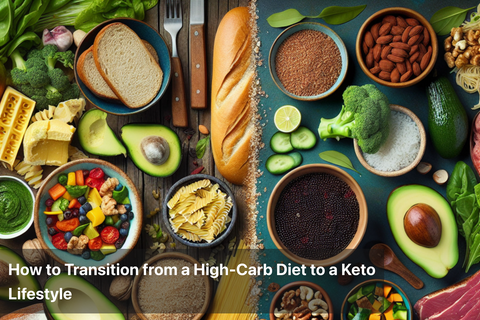
Is keto diet good for weight loss?
The keto diet has become wildly popular for weight loss lately. But it's not just a fad - keto is a low-carb, high-fat plan designed to shift your body into ketosis. Basically, ketosis means your body burns fat, not carbs, for fuel. What makes keto unique is severely limiting carbs, so your body enters fat-burning mode. This metabolic switch interests people trying to shed pounds and scientists alike.
The appeal is rapid weight loss without giving up satisfying, nutrient-rich foods. As we dive deeper, keto offers more than just dropping pounds on the scale - it taps into your body's natural ability to use fat for energy. Let's explore the keto journey and why so many are turning to this method for effective weight management. Keto isn't just about weight loss - it's about leveraging your body's fat-burning potential through a low-carb approach.

The Science Behind Keto Weight Loss
Ketosis State: The keto diet reduces carbohydrate intake, prompting the body to enter ketosis, a metabolic state where fat becomes the primary energy source instead of glucose.
Fat as Fuel: In ketosis, the liver converts fatty acids into ketones, which are used as an alternative fuel source for the brain and body.
Reduced Insulin Levels: Lower carbohydrate intake leads to decreased insulin levels, facilitating fat breakdown and reducing fat storage.
Appetite Suppression: High-fat and moderate-protein intake can increase satiety hormones like leptin and decrease hunger hormones like ghrelin, reducing overall calorie consumption.
Improved Insulin Sensitivity: Ketogenic diets can enhance insulin sensitivity, improving the body's ability to utilize glucose and reduce fat storage.
Increased Energy Expenditure: Some studies suggest that the process of converting fat to ketones may increase the body's energy expenditure, aiding weight loss.
Reduced Fat Storage Enzymes: The keto diet may downregulate enzymes responsible for fat storage, promoting fat loss.
Gluconeogenesis: The body produces glucose from non-carbohydrate sources like protein and fat, which can lead to increased fat burning.
Water Weight Loss: Initial weight loss on the keto diet often includes significant water weight, as glycogen stores are depleted, which bind water.
Caloric Deficit: By reducing appetite and increasing satiety, the keto diet can help individuals maintain a caloric deficit, essential for weight loss.
Hormonal Balance: The diet may balance hormones that regulate weight, such as insulin, ghrelin, and leptin, contributing to sustained weight loss.
Preservation of Muscle Mass: Adequate protein intake on the keto diet helps preserve lean muscle mass, which is important for maintaining metabolic rate during weight loss.
Keto food items supporting weight loss
Food Item |
Serving Size |
Calories |
Carbohydrates |
Protein |
Fat |
Fiber |
Other Nutrients |
|---|---|---|---|---|---|---|---|
Avocado |
1 medium |
234 |
12g |
3g |
21g |
9g |
Potassium, Vitamin K, Folate |
Eggs |
1 large |
70 |
1g |
6g |
5g |
0g |
Vitamin B12, Selenium, Choline |
Salmon |
3 oz (85g) |
175 |
0g |
19g |
11g |
0g |
Omega-3 Fatty Acids, Vitamin D |
Spinach |
1 cup (30g) |
7 |
1g |
1g |
0g |
1g |
Vitamin A, Vitamin C, Iron |
Cheese (Cheddar) |
1 oz (28g) |
113 |
1g |
7g |
9g |
0g |
Calcium, Vitamin B12, Phosphorus |
Chicken Breast |
3 oz (85g) |
140 |
0g |
26g |
3g |
0g |
Niacin, Vitamin B6, Phosphorus |
Almonds |
1 oz (28g) |
160 |
6g |
6g |
14g |
3g |
Magnesium, Vitamin E, Manganese |
Broccoli |
1 cup (91g) |
31 |
6g |
3g |
0g |
2g |
Vitamin C, Vitamin K, Folate |
Olive Oil |
1 tbsp (14g) |
120 |
0g |
0g |
14g |
0g |
Vitamin E, Antioxidants |
Greek Yogurt (Full-Fat) |
1 cup (245g) |
220 |
9g |
22g |
11g |
0g |
Probiotics, Calcium, B Vitamins |
Beef (Ground, 80% lean) |
3 oz (85g) |
231 |
0g |
22g |
15g |
0g |
Zinc, Iron, Vitamin B12 |

Exploring the Keto Diet for Weight Loss Success
The keto diet offers a unique weight loss approach by leveraging the body's metabolic flexibility to burn fat through ketosis. The science behind keto reveals how ketosis, insulin sensitivity, and fat metabolism align to enable effective, sustained weight loss. These mechanisms demonstrate keto's potential as a transformative journey.
Yet keto success requires navigating challenges from flu symptoms initially to long-term sustainability. Strategic planning, creativity, and personalization are key. Real-world tips like hydration, nutrition balance, lifestyle customization, and mindful indulgences emerge from keto veterans.
In essence, keto is a powerful weight loss tool when its principles are understood, challenges addressed proactively, and a sustainable path found. More than just losing weight, it's a lifestyle fostering resilience and optimal wellbeing. Keto requires commitment but can reap transformative results.
This Blog post is an initiative by Lo! Foods, to provide accurate and Nutritionist / Doctor approved information related to Health. Lo! Foods is India's leading brand for Everyday Functional Foods. Foods designed for specific Health conditions or Needs. Lo! Foods also runs India's largest range of Low Carb Healthy Cloud Kitchens, under the brand names of Lo!, ProteinChef, ATH (All Things Healthy) and DiabeSmart.













Leave a comment
Your email address will not be published.